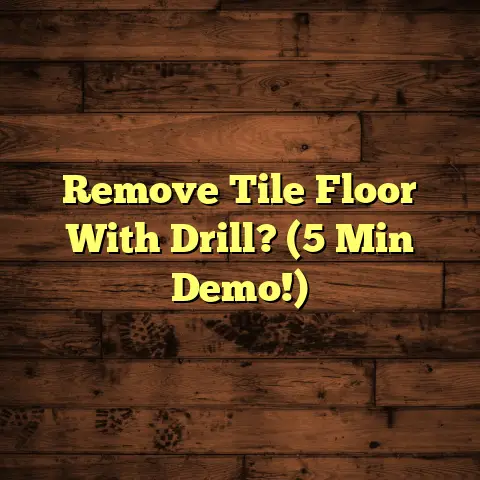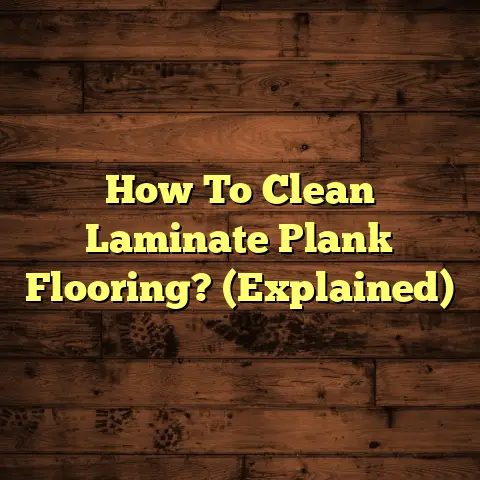Vinyl Flooring Cost Per Sq Ft Labor (Explained)
Vinyl flooring has become a popular choice for homeowners and commercial spaces alike, admired for its durability, versatility, and affordability.
Understanding the cost per square foot for vinyl flooring installation, especially labor costs, is crucial for budgeting your flooring project effectively.
This article will provide a comprehensive overview of the key factors influencing vinyl flooring costs, compare it with hardwood and other flooring options, and offer tips on maintenance and installation.
Overview of Major Cost Factors
The total cost of installing vinyl flooring can vary significantly based on several factors:
1. Area Size
The size of the area to be covered is one of the most significant determinants of cost.
Larger areas often benefit from economies of scale, meaning the cost per square foot may decrease with increased area.
2. Type of Vinyl Flooring
Vinyl flooring comes in various forms:
- Vinyl Plank Flooring (LVP): Mimics hardwood appearance; generally more expensive.
- Vinyl Tile Flooring (LVT): Offers a variety of designs; costs can vary widely.
- Sheet Vinyl: Usually the most affordable option; comes in large rolls.
3. Labor Costs
Labor costs can fluctuate based on location, complexity of the installation, and the contractor’s experience.
On average, labor costs for vinyl flooring installation range from $1 to $5 per square foot.
4. Additional Considerations
- Floor Removal: Removing old flooring can add $0.50 to $2 per square foot.
- Subfloor Replacement: If the subfloor is damaged, replacement can cost an additional $1 to $3 per square foot.
- Material Grade: Higher quality vinyl typically comes at a premium price.
- Room Size/Layout: Odd-shaped rooms may require more cutting and waste, increasing labor costs.
- Installation Type: Glue-down, click-lock, or loose lay methods can affect labor rates.
Detailed Cost Breakdown
Average Installation Costs
Cost by Vinyl Type
Comparison with Other Flooring Options
When considering flooring options, it’s helpful to compare vinyl with hardwood and other alternatives.
Hardwood Flooring
- Cost: $5 to $12 per sq ft (materials and labor).
- Durability: Very durable but can scratch and dent.
- Maintenance: Requires regular refinishing.
Laminate Flooring
- Cost: $1 to $4 per sq ft (materials and labor).
- Durability: Good resistance to scratches but can’t be refinished.
- Aesthetic: Offers a wood-like appearance.
Carpet
- Cost: $2 to $5 per sq ft (including padding and installation).
- Comfort: Soft underfoot but less durable in high-traffic areas.
- Maintenance: Requires regular cleaning and can stain.
Signs Hardwood Floors Need Replacement
While this article focuses on vinyl flooring, understanding when to replace hardwood floors can be valuable:
- Severe Scratching or Gouging: If deep scratches or gouges are present that cannot be sanded out.
- Cupping or Crowning: Warping caused by moisture issues may indicate replacement over refinishing.
- Extensive Water Damage: If there are sections with severe water damage that affect structural integrity.
Pros and Cons of Vinyl Flooring
Pros
- Affordability: Generally lower cost than hardwood.
- Durability: Resistant to moisture and stains; great for high-traffic areas.
- Variety: Available in many styles and designs to suit any décor.
Cons
- Less Longevity than Hardwood: While durable, its lifespan is shorter than that of hardwood.
- Resale Value: May not add as much value to a home as hardwood flooring.
Professional Installation vs. DIY
Professional Installation
Hiring a professional can ensure proper installation, which is crucial for longevity.
However, it comes at a cost:
- Cost: Typically adds $1 to $5 per sq ft for labor.
- Benefits: Experience with tricky installations, warranties on workmanship.
DIY Installation
While tempting to save money, DIY installation requires:
- Tools: Special tools may be needed (e.g., saws, levels).
- Skills: Knowledge of proper installation techniques.
A poorly installed floor can lead to costly repairs down the line.
Questions to Ask Hardwood Flooring Contractors
When considering hiring a contractor for your vinyl flooring project, ask:
- What is your experience with vinyl flooring installations?
- Can you provide references from previous clients?
- What warranties do you offer on installation?
- How do you handle unforeseen issues during installation?
- What is included in your estimate?
Care and Maintenance Tips for Vinyl Flooring
To maximize the lifespan of your vinyl floors:
- Regular Cleaning: Sweep or vacuum frequently to remove dirt and debris.
- Mop with Care: Use a damp mop with a mild cleaner; avoid excess water.
- Prevent Scratches: Use felt pads under furniture legs.
- Avoid Harsh Chemicals: They can damage the finish over time.
Conclusion
Vinyl flooring presents an attractive alternative to hardwood with its affordability and ease of maintenance.
By understanding the various cost factors involved in installation—from area size to labor rates—you can make informed decisions that suit your budget and aesthetic preferences.
Whether you choose professional installation or opt for DIY, ensuring proper care will extend the life of your flooring investment.
For any flooring project, gathering estimates and understanding the nuances of each material will empower you to make the best choice for your space.





